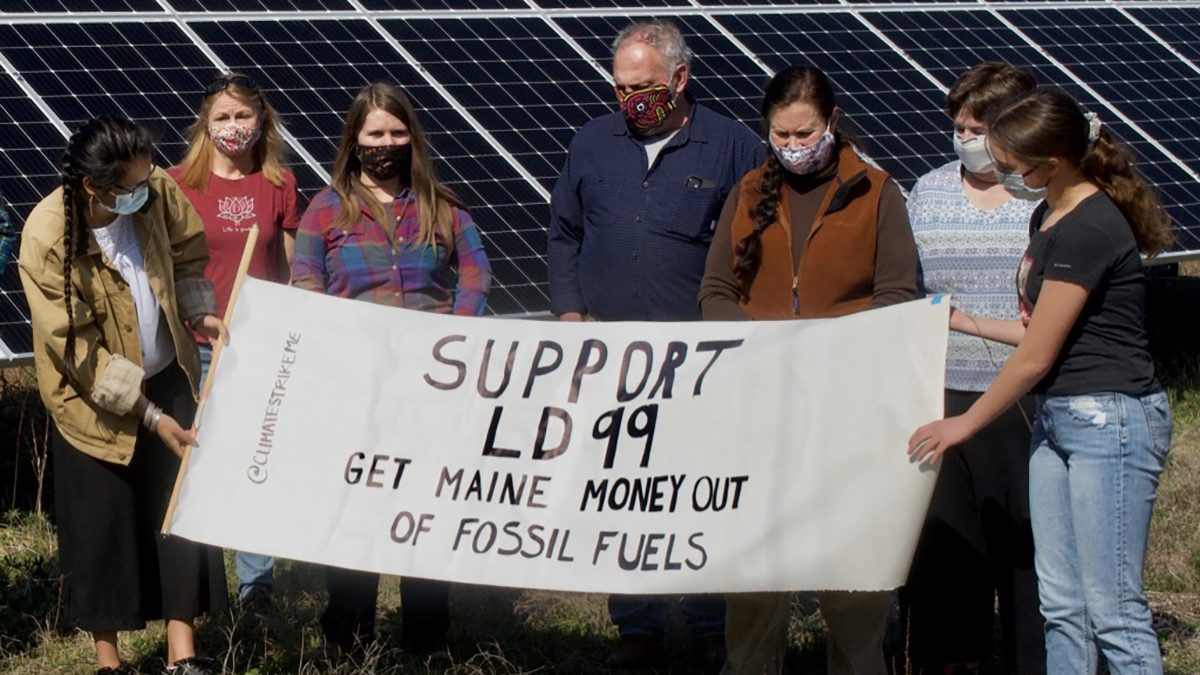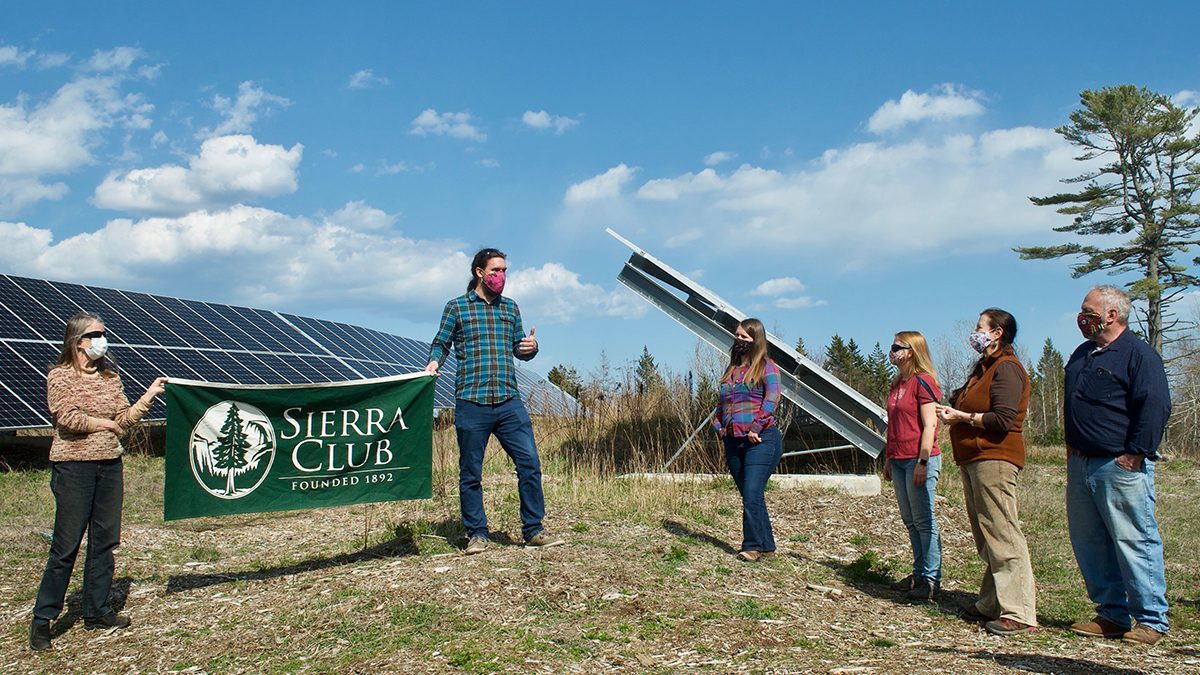The afternoon sun bounced off a solar array in Tremont, on the southern part of Mt. Desert Island, as a dozen students, teachers, activists and retirees rallied in support of a trailblazing bill aiming to divest Maine’s public funds from fossil fuels.
“We’re standing in one of the most vulnerable towns in Maine for sea level rise right now, and we’re standing in front of a solution to the fossil fuel problem right now,” said Tremont Selectman Kevin Buck at the April 24 event. “All of this is doable, and to have them investing out-of-state in the same thing that’s basically destroying our climate is just unconscionable.”
The bill, LD 99, would require the state treasurer’s office and the board of the Maine Public Employee Retirement System (MainePERS) to sell all fossil fuel investments by Jan. 1, 2026, and until then provide yearly divestment reports to the Legislature’s Appropriations and Financial Affairs committee.
While states such as New York have divested their pension funds from fossil fuel companies, Maine’s LD 99 will become the first legislative directive of its kind in the country if it passes.
“It is a bold law and a bold statement,” said Henry Beck, Maine’s treasurer.
Support for the bill has been divided; in a policy committee, lawmakers voted 7-5 to recommend its passage. The full Legislature could vote as early as May 19.

Students, teachers and retirees were among those who rallied to support a legislative push to divest Maine’s public funds from the fossil fuel industry on Mt. Desert Island on April 24. Photo by Katie Brown.
Divesting from fossil fuel companies will be a more onerous task for Maine’s retirement system than the treasurer’s office. While the $70 million fund that Beck’s office oversees is entirely tied up in public markets through bonds and equities, the $16.4 billion of retirement funds MainePERS manages is divided, with 45 percent invested in public markets and 55 percent in private markets.
“We do very uncomplicated investing and that’s why it’s easier for us to deal with these legislative directives,” said Beck. “It’s easier to unwind those stock investments than, say, a private equity arrangement.”
There are two types of broad investment strategies — passive and active. Passive investing means money invested will follow the highs and lows of the market; active requires investors to pick and choose holdings.
MainePERS uses both strategies to manage the retirement funds of at least 110,500 Maine workers; it actively invests the assets tied up in private markets and passively invests those in public markets.
When it comes to passive investing, “We buy the entire market and let market forces determine what our relative ownership is,” said Sandy Matheson, executive director of MainePERS. “We don’t try and guess who’s going to be a winner and who’s going to be a loser.”

David Gibson, a member of Sierra Club Maine’s executive committee, thinks divesting public funds from fossil fuels makes financial and environmental sense. Photo by Katie Brown.
At the end of 2020, over $1.27 billion was invested in fossil fuel holdings across the supply chain, from infrastructure to transportation. This accounts for 7.7 percent of the total funds MainePERS manages, according to the agency.
About $1.5 million of the funds overseen by the treasurer — roughly 2.5 percent of the total — was invested in the energy sector more broadly as of February.
“All of this money is being invested in other places, creating jobs and building infrastructure out of the state,” said David Gibson, a Sierra Club member who analyzed MainePERS holdings in support of the bill. “Inaction on this issue is hurting 100,000 public employees and retirees across the state, as well as hurting the planet for future generations.”
MainePERS’ public fossil fuel assets dropped 1.5 percent between 2019 and 2020, translating to a loss of $91 million. The agency recovered $50 million this year and sees the bill as a hurdle that would force the system to actively manage all its public fossil fuel holdings.
“The fear is active investing takes a lot more work and costs a lot more,” said Matheson. “It’s also more volatile year to year.”
Gibson sees the diminishing returns on fossil fuels and wave of nearly $15 trillion in institutional fossil fuel divestments as turning points. Since the last divestment bill was proposed in Maine in 2014, fossil fuel stocks within the energy sector decreased 55 percent, he pointed out.
“You want to be on the starting end of the phase-out, not on the tail end, or you’re going to get left holding on to investments that are worthless,” said Gibson. “At some point there’s going to be no one left to buy the stock.”
The legacy of distrust in fossil fuel companies comes from decades of shielding the public from the irreversible impacts of emitting massive amounts of carbon into the atmosphere. Climate denial funded by fossil fuel companies contributing the most to climate change is well-documented and has been compared to actions by tobacco companies that withheld scientific knowledge of public health harm in favor of profit.
Moral sense and constitutional obligations
For environmental science teacher Ruth Poland, divesting public funds from fossil fuels to prevent increasing emissions and avoid tipping points “makes total financial sense,” and moral sense.

Ruth Poland, an environmental science teacher whose pension is managed by MainePERS, said the agency’s investment in fossil fuels runs counter to her moral beliefs and teachings about the climate crisis. Photo by Katie Brown.
“I’m spending my working life educating students about the climate crisis and yet, with every paycheck I get, I’m funding the extraction of fossil fuels,” said Poland, who works at Mt. Desert Island High School and helped organize the rally in Tremont. “It just seems so anathema. It’s just so counter to my moral beliefs and to what I think the world needs to be a better place.”
Matheson sees disinvestment directives tied to social or moral arguments as conflicting with MainePERS’ fiduciary responsibility.
“The bill wants us to be climate activists with the fund,” said Matheson. “We don’t have the right as fiduciaries to advance social causes.”
But that’s why the proposed legislation specifies divestment decisions must be “in accordance with sound investment criteria and consistent with the board’s fiduciary obligations,” said Rep. Margaret O’Neil (D-Saco), one of the bill’s sponsors.
“Excuses from financial professionals are exactly why we are in the situation we’re in in the first place,” said O’Neil. “We want to do what’s ethical for the public good and we want to honor our commitments to retirees.”
Constitutional arguments against the bill have been building. After a legislative committee asked Attorney General Aaron Frey to weigh in, he wrote that LD 99 contradicts a constitutional requirement that funds appropriated to the state’s retirement system “may not be divested or deappropriated by any subsequent action,” and that its assets must be “held, invested or disbursed as in trust for the exclusive purpose of providing for (retirement and related) benefits.”
Prohibiting MainePERS from acquiring assets in the fossil fuel industry would “require the trustees to refrain from certain investment activity regardless of whether it would be in the best interest of the beneficiaries,” Frey wrote in an informal opinion April 9.
“Unless a failure to divest an asset would be a breach of the Trustees’ existing fiduciary duties (i.e., not in the best interest of the members) any attempt to enforce the statutory requirement to divest would be meritless,” he added.
But MainePERS has divested at least two other times — in protest of South Africa’s apartheid regime in the 1980s and again over 20 years later during the Darfur genocide that still impacts Sudan.
During that genocide, a similar case over the constitutionality of divesting state retirement funds from companies connected to social welfare causes was tested in the New Hampshire Supreme Court. In 2010, the court ruled the legislative divestment directive was constitutional, but lawmakers repealed it a year later because it was too costly for the state.
Opponents argue for engagement over divestment
Officials opposed to the new bill maintain that divestment won’t transform how fossil fuel companies operate, prompting conversations about how to create meaningful change.
“I fully support the goals of LD 99, but divestment from oil companies’ stocks doesn’t actually impact the oil company, and it’s a primarily symbolic act,” said Rep. Scott Cuddy of Winterport, the only Democrat who voted against the bill in committee. “We are a very small fund and divestment isn’t effective until you have an enormous amount of capital moving away from stocks.”
Matheson and others argue that institutional investors like MainePERS can create a larger effect by voicing opinions as shareholders on issues like the transition to renewable energy.
“There’s nobody else better positioned to change the fossil fuel companies than the shareholders of those companies. And if you divest, you step back from that opportunity. You give up the option of voting,” said Ric Marshall, executive director of MSCI ESG Research — a global firm that analyzes environmental, social, and governance-related investments. “Which is the better course? Divestment or continued engagement?”
During a Feb. 10 public hearing on the bill, the only other party besides MainePERS that opposed the bill was David O’Donnell, a lobbyist for the American Petroleum Institute. MainePERS and the American Petroleum Institute acknowledge the fossil fuel industry is waning but also see shareholder engagement as the path forward rather than disinvestment.
“The divestment movement seems to present investors with two choices – show their displeasure with an entire industry by selling all of its shares or take the better course of action and remain invested but use their shareholder power to change the situation – to work with companies in good faith to reduce their emissions rather than hope that public shaming, punishment and discipline will achieve the same results,” wrote O’Donnell.
Divestment decisions haven’t required legislative authorization in the past, he added.
“My understanding is that if the investments in fossil fuels are not generating the returns that they ought to — or are not profitable — my understanding is that the trustees of the retirement funds in Maine have a fiduciary duty to not invest or to divest from those funds now,” said O’Donnell. “That leads to the question of: Is this legislation necessary?”
But for Poland, the environmental science teacher, the symbolism is important.
“Divestment is one of those few places where we can actually stick a wrench in the machinations of these larger systems because we can make a financial disincentive,” she said. “It just feels like a very powerful tool that a community — a group of real, actual people — can use to change the way the system works.”
